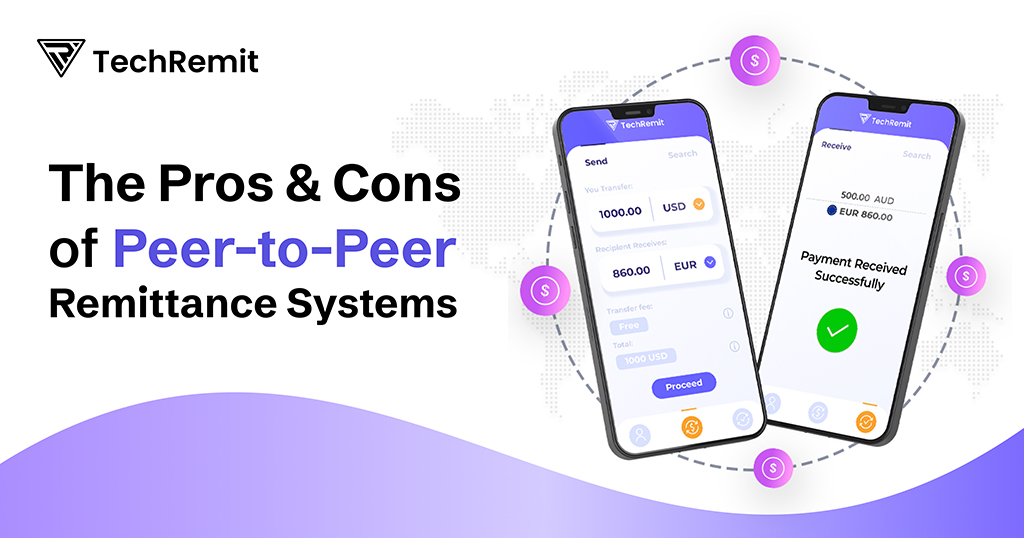The Pros and Cons of Peer-to-Peer Remittance Systems

Traditional cross-border transaction systems were way too complex and demanded the involvement of multiple intermediaries. However, the remittance industry has recently undergone a significant transformation with the introduction of peer-to-peer remittance software, which enables direct transfers. These platforms have gained immense popularity due to the convenience they offer in streamlining remittance services. Nonetheless, they do have some drawbacks. In this article, we will learn more about peer-to-peer remittance systems, as well as their advantages and disadvantages.
Peer-to-Peer Remittance Systems Explained
What Are Peer-to-Peer Remittance Systems?
As the name suggests, P2P remittance systems are remittance solutions that carry peer-to-peer transfers, allowing individuals to send money directly to one another. Unlike the traditional approach, these platforms directly transfer funds via an online application without involving a chain of financial institutions such as multiple banks or remittance service providers.
How Do Peer-to-Peer Remittance Systems Work?
In order to make remittance as simple as possible, P2P remittance platforms use advanced technologies such as APIs, blockchain, AI, and real-time databases. Here’s a brief breakdown of how most P2P remittance systems function.
- The sender and recipient both need to register on the platform following the necessary verification process.
- The sender can input the amount they need to send and choose the transfer method, such as direct bank transfer, e-wallet, etc.
- The money is sent to the recipient in their preferred local currency.
- This transaction occurs instantly, and both users are notified when it is finished.
Pros And Cons Of Peer-to-Peer Remittance Systems
Lower Transaction Fees and Competitive Exchange Rates
Peer-to-peer remittance systems allow users to get better value for their money transfers due to better exchange rates and minimal fees. As these platforms carry direct transfers and don’t involve multiple intermediaries, they cut operational costs and reduce transaction fees as well. Additionally, the exchange rates offered by these remittance systems for money transfers are quite competitive.
Quick Transfers
P2P remittance software provides same-day transfers with its mobile wallets or local bank transfers. Depending on the location and strength of the P2P remittance infrastructure, transfers can even take a few seconds. This was not possible a few years ago with traditional remittance platforms, which took days to process international money transfers.
Convenience and Accessibility
P2P remittance systems are typically online platforms that can be accessed via mobile devices from any location and at any time. They no longer need to wait in line and fill out numerous forms in order to request the transfers, unlike in the past.
Not only does this degree of convenience benefit senders, but it also helps users on the receiving end. Recipients in remote locations without access to banks can directly receive payments online.
Transparency and Control
During the order initiation, P2P remittance solutions provide a detailed breakdown of the fees the sender needs to pay and the amount that will be transferred to the receiver. Such transparency was lacking in traditional money transfer services, leaving users unaware of the actual cost of the transfers.
However, the platform not only offers transparency in the pricing structure but also in the overall remittance process. Users, both senders and receivers, can track the status of their remittances from their devices and even get real-time notifications.
Security Features
The P2P remittance platforms don’t have the same regulatory structure backing as traditional banks. However, they employ advanced security features such as encryption and authentication technologies to protect the users’ data and funds.
Cons of P2P Remittance Systems
Limited Availability
There are still some countries where P2P remittance solutions are not available. The main reason for this is that in certain areas, the regulations do not support P2P remittance infrastructure. Furthermore, traditional remittance services are the only choice in places with poor mobile networks and internet access.
Limited Customer Support
As P2P remittance software provides online remittance services, they can’t provide the same level of customer service or support as traditional financial institutions. Despite their online support, users still face difficulty receiving immediate assistance and issue resolution.
Transaction Limits
Many remittance systems impose caps on the amount of money that can be transferred at once or within a day, week, or month. These restrictions are primarily designed to prevent illegal cross-border transactions. However, they can create unnecessary limitations for businesses that need to make significant transfers for critical transactions. Additionally, individuals who need to send money across borders to pay for tuition, medical emergencies, or other urgent needs may also find difficulty in P2P transactions.
Fraud and Scams
Even so, P2P remittance platforms typically offer a safe way to send and receive money internationally. Fraudulent has still found a way to take advantage of users who are unfamiliar with how the platform functions. Incomplete identity verification can also lead to scams, where fraudulent users use the platform to conduct illicit transactions.
Wrapping Up
Undoubtedly, peer-to-peer remittance systems are a better alternative to traditional remittance platforms. They have benefitted the remittance industry with swiftness, affordability, and accessibility in remittance. Still, they present some limitations around regulations, security, and customer service.
However, with the expertise of a reliable remittance software development company like Tech Remit, businesses can build robust peer-to-peer remittance systems for their customers. We leverage all the latest technologies to build white-label remittance platforms that facilitate peer-to-peer cross-border transactions. Get in touch to know more about our services.
Also Read : Why Does Every Money Transfer Business Need a White-Label Remittance Software?